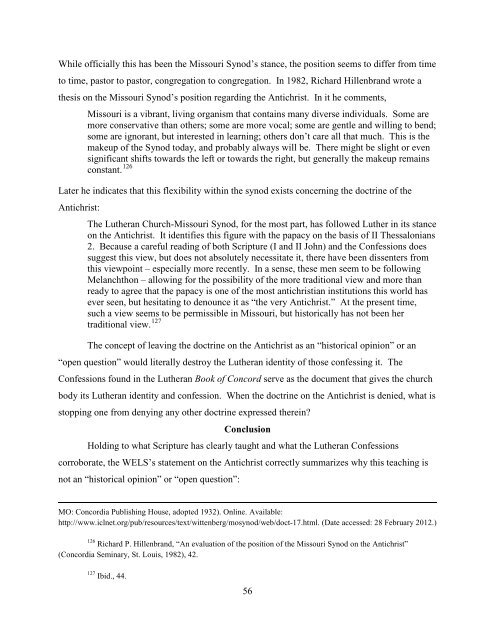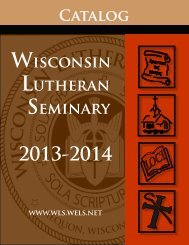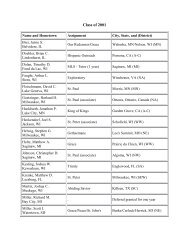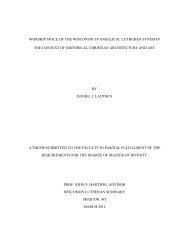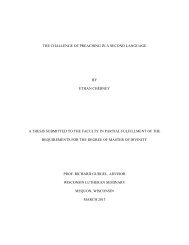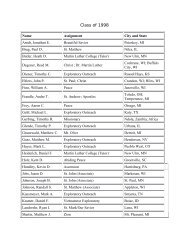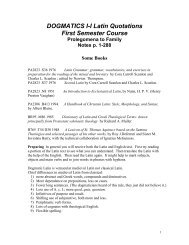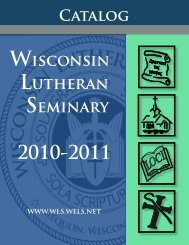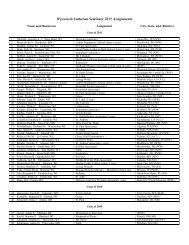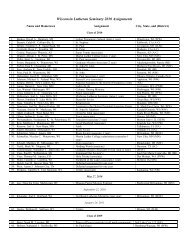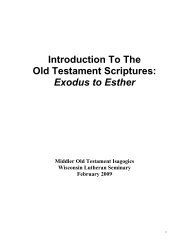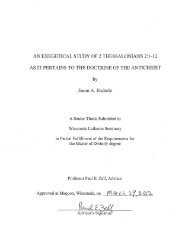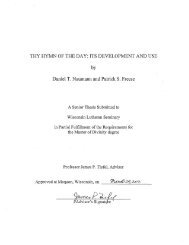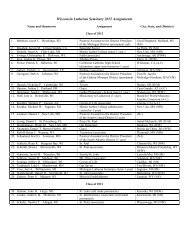Untitled - Wisconsin Lutheran Seminary - WELS
Untitled - Wisconsin Lutheran Seminary - WELS
Untitled - Wisconsin Lutheran Seminary - WELS
Create successful ePaper yourself
Turn your PDF publications into a flip-book with our unique Google optimized e-Paper software.
While officially this has been the Missouri Synod’s stance, the position seems to differ from time<br />
to time, pastor to pastor, congregation to congregation. In 1982, Richard Hillenbrand wrote a<br />
thesis on the Missouri Synod’s position regarding the Antichrist. In it he comments,<br />
Missouri is a vibrant, living organism that contains many diverse individuals. Some are<br />
more conservative than others; some are more vocal; some are gentle and willing to bend;<br />
some are ignorant, but interested in learning; others don’t care all that much. This is the<br />
makeup of the Synod today, and probably always will be. There might be slight or even<br />
significant shifts towards the left or towards the right, but generally the makeup remains<br />
constant. 126<br />
Later he indicates that this flexibility within the synod exists concerning the doctrine of the<br />
Antichrist:<br />
The <strong>Lutheran</strong> Church-Missouri Synod, for the most part, has followed Luther in its stance<br />
on the Antichrist. It identifies this figure with the papacy on the basis of II Thessalonians<br />
2. Because a careful reading of both Scripture (I and II John) and the Confessions does<br />
suggest this view, but does not absolutely necessitate it, there have been dissenters from<br />
this viewpoint – especially more recently. In a sense, these men seem to be following<br />
Melanchthon – allowing for the possibility of the more traditional view and more than<br />
ready to agree that the papacy is one of the most antichristian institutions this world has<br />
ever seen, but hesitating to denounce it as “the very Antichrist.” At the present time,<br />
such a view seems to be permissible in Missouri, but historically has not been her<br />
traditional view. 127<br />
The concept of leaving the doctrine on the Antichrist as an “historical opinion” or an<br />
“open question” would literally destroy the <strong>Lutheran</strong> identity of those confessing it. The<br />
Confessions found in the <strong>Lutheran</strong> Book of Concord serve as the document that gives the church<br />
body its <strong>Lutheran</strong> identity and confession. When the doctrine on the Antichrist is denied, what is<br />
stopping one from denying any other doctrine expressed therein<br />
Conclusion<br />
Holding to what Scripture has clearly taught and what the <strong>Lutheran</strong> Confessions<br />
corroborate, the <strong>WELS</strong>’s statement on the Antichrist correctly summarizes why this teaching is<br />
not an “historical opinion” or “open question”:<br />
MO: Concordia Publishing House, adopted 1932). Online. Available:<br />
http://www.iclnet.org/pub/resources/text/wittenberg/mosynod/web/doct-17.html. (Date accessed: 28 February 2012.)<br />
126 Richard P. Hillenbrand, “An evaluation of the position of the Missouri Synod on the Antichrist”<br />
(Concordia <strong>Seminary</strong>, St. Louis, 1982), 42.<br />
127 Ibid., 44.<br />
56


